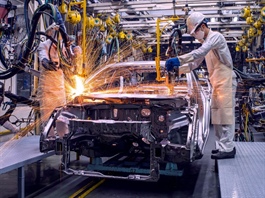M&A set for a bustling second half
M&A set for a bustling second half
Mergers and acquisitions (M&A) deal-making will probably increase at a steady pace in the second half of 2020, led by the upcoming mega deal of Vietnam’s leading brewer Sabeco.

M&A activities will pick up in the second half of 2020
|
According to a government document released last week, the Vietnamese government will sell its remaining 36 per cent stake in Sabeco by the end of this year. The state can collect VND37.6 trillion (around $1.63 billion) from the divestment. The Ministry of Industry and Trade will complete the stake transfer to State Capital Investment Corporation by late August to facilitate the deal. With an investment sum of nearly $5 billion, Thai Beverage’s takeover of Sabeco in 2017 was Vietnam’s biggest mergers and acquisitions (M&A) to date. If the mega deal of 2017 can be replicated in 2020, it will keep the deals flowing in Vietnam, especially as the overall M&A market in the region has slowed down due to the coronavirus pandemic.
According to Baker McKenzie, despite a slowdown in global deal-making due to worldwide economic uncertainty, Vietnam remains active in M&A. The US law firm predicted cross-border acquisitions to dominate M&A deals in the coming years, as the country’s solid fundamentals continue to attract foreign investors.
Vu Thi Que, chairwoman of law firm Rajah & Tann LCT, is upbeat about the prospects of deals in the second half of this year. She said that the number of M&A transactions will increase, spread across many areas as well as in size, ranging from small to medium and big deals. The main reason of this is that many enterprises will be torpedoed by the coronavirus and be left with no option but to sell or merge with others. In addition, M&A is the fastest option to expand business scale and market share for businesses with strong capital operating in areas not or only a little affected by the epidemic.
Indeed, M&A activity in Vietnam was down 56.8 per cent on-year in the first half of 2020 with 4,125 instances of capital contribution and stake purchase worth $3.5 billion. According to fresh data from the Ministry of Planning and Investment’s Foreign Investment Agency. There have been a number of high-profile deals recently, buoyed by investor interest in Vietnam’s M&A market. Japan’s Mitsubishi UFJ Lease & Finance Co., Ltd. is acquiring a 49 per cent equity interest in VietinBank Leasing, a wholly-owned subsidiary of VietinBank. The transaction was signed on June 22 and is pending government approval.
Meanwhile, Manulife Financial Corporation is emerging as the leading bidder for Aviva Plc.’s Vietnamese unit as it looks to expand in Southeast Asia. The Canadian insurer is weighing a deal that would include a so-called bancassurance agreement with Aviva’s local partner VietinBank to sell insurance products through the state-owned lender’s branches, as reported by Bloomberg.
In June, a consortium led by global investment firm KKR that includes Singapore’s Temasek has completed an investment in Vinhomes, the leading integrated real estate developer in Vietnam. The consortium has collectively invested VND15.1 trillion ($656.5 million) which translates into a 6 per cent equity stake in Vinhomes. The investment underscores the attractiveness of Vietnam as a regional investment destination with its strong development and growth prospects.
In May, SK Investment III, a subsidiary of South Korea’s third-largest conglomerate SK Group, got more than 12 million shares (nearly 25 per cent) of Imexpharm Corporation at an undisclosed value in further testimony to the group’s longterm designs in Vietnam.
Commenting on the latest deals, Masataka Sam Yoshida, head of the Cross-border Division and CEO of Vietnam RECOF Corporation, said, “If we look at the VietinBank deals, without knowing the detailed background, the deals with Mitsubishi and Aviva look like ‘given’ transactions which had to happen due to their existing relations. The Mitsubishi UFJ Lease & Finance deal was a direct result of the firm relationship between their parent banks and the deal with Aviva may also come from the long-standing historical relations between Aviva and VietinBank.”
Only SK Group’s deal looks like a new development, however, this may be more of a financially-oriented transaction supported by the bright prospects of Vietnam’s pharmaceutical sector. Thus, the driving factors activating the market in the coming time are the Vietnamese government’s policies to open the gates wider for visiting investors as early as possible as well as optimising decision-making on the side of local authorities not to interfere unduly and to approve foreign investors with intentions of finding local partners and willing to pay a fair price.
Sam Yoshida believed in the dynamism of the Vietnamese economy to attract big investments led by mega companies. However, he said he would monitor this trend further to see if it will be a prevalent trend or will be slowed down by the numerous factors clearly affecting the business activities of global corporations.
For instance, the Japanese M&A market saw a 16 per cent drop on-year in deals during the first half of 2020, accompanied by a 59 per cent decrease in transaction value. There are similar trends in the United States, however, it is not easy to make a clear comparison as there are very different circumstances. The RECOF expert hoped Vietnam would maintain the current trend and stay a healthy M&A market post-pandemic.
Meanwhile, Que of Rajah & Tann LCT said that recent big deals are mostly due to two reasons. Firstly, the epidemic has plunged many economies into deep recession and disruption. In many of the affected countries, despite social distancing, the epidemic cannot be controlled and has taken a heavy toll on many big corporations who, in turn, are looking to disperse risks and make considerable investments in potential markets which are not seriously affected by the epidemic, like Vietnam. Accordingly, the sectors seeing large M&A deals are the ones with elevated potential like insurance, healthcare, and banking.
Secondly, Vietnam has had relatively stable GDP growth during the past three years (about 7 per cent in 2017-2019). In contrast with the global economy, the Vietnamese government’s success in fighting the virus means it has first-mover advantage in reopening the economy, and projects could be implemented with much greater ease.





















